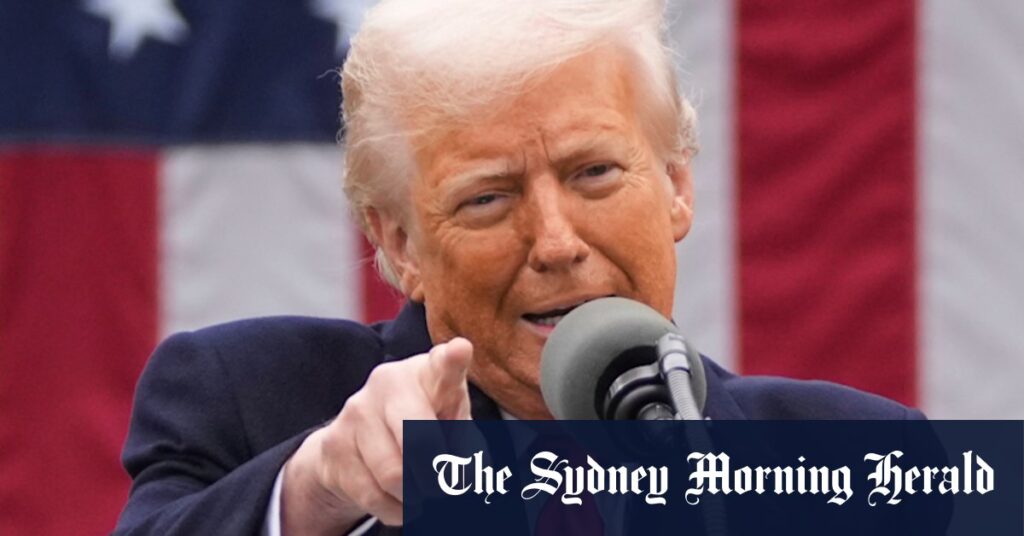Global oil prices fell on fears of a slowdown in the American economy, while gold hit an all-time high of $US3192 on expectations the US will face higher inflation due to the tariffs.
Australia has had a free trade agreement with the US since 2005 and no tariffs. But it maintains other barriers, including the beef ban and other measures that have long irked the US trade office and Trump’s economic advisers.
Prime Minister Anthony Albanese was the first world leader to respond to the announcement, interrupting the federal election campaign to hold a press conference just 30 minutes after Trump had finished speaking.
He said Trump’s tariffs were “unwarranted” and had “no basis in logic”, would disrupt the global economy and harm the American people most of all.
“This is not the act of a friend,” he said. “The Australian people have every right to view this action by the Trump administration as undermining our free and fair trading relationship, and counter … our two nations’ long-standing friendship.”
Trump’s move would have consequences for how Australians saw the relationship between the two countries, Albanese said.

Commerce Secretary Howard Lutnick holds up a chart showing tariffs of 10 per cent on Australia and other countries.Credit: AP
He indicated Australia would not impose retaliatory tariffs, and would continue to negotiate with the Trump administration. But US grievances with Australia, such as the Pharmaceutical Benefits Scheme and biosecurity arrangements, were not on the table.
Albanese announced a five-point plan to immediately deal with the tariffs. It includes an extra $5 million for the Anti-Dumping Commission to protect key industries such as steel and manufacturing, $50 million in trade support for companies to find new markets and prioritisation of Australian firms in government procurement and local content.
Coalition leader Peter Dutton, who backed the measures on anti-dumping, extra trade support and government procurement, said he could have negotiated a better outcome with the Trump administration.
Loading
“This is a bad day for our country. I want to resolve the matter and the question for us now is who is best able to deal with this relationship?” he said.
The Australian Industry Group has warned that Trump’s tariffs will lead to dumping of manufactured goods across the rest of the world.
Group chief executive Innes Willox said with around 50 per cent of goods being intermediate goods – components of unfinished products – the tariffs would have a far-reaching impact beyond products immediately hit by the tariffs.
“Goods destined for the US may likely need to find a new home, raising the prospect of an influx of displaced goods coming to Australia,” he said.
The Business Council of Australia, which represents the nation’s 100 biggest businesses, has warned Trump’s tariffs will hurt economic growth while urging a “measured” response from the federal government.
“We don’t support retaliatory tariffs and strongly urge against them, because there are no winners in a trade war, which would only risk making our situation worse by forcing Australians to pay more and reducing job security,” the council’s chief executive Bran Black said.
Betashares chief economist David Bassanese said the tariffs would push up prices for American consumers by around 2 per cent and reduce US economic growth by a full percentage point.
He said it increases the risk of an economic slowdown in Australia, which could force the Reserve Bank to slice official interest rates at its next meeting in May.
“Today’s announcement is close to a worst-case scenario and the odds of a US or global recession have clearly increased,” he said.
Loading
“For Australia, the net effect of today’s announcement is that it poses much more downside risk to economic growth than upside risk to inflation – hence it adds to the case for an RBA rate cut as early as next month.”
Standing in the White House Rose Garden, surrounded by hanging American flags, Trump said the tariffs were “a declaration of economic independence” and lashed out at “foreign cheaters” and “scavengers” for “ripping off” the US. He blamed previous presidents for allowing the imbalance to occur.
An executive order released shortly after Trump’s speech said he would impose the tariffs using his executive authority by declaring a national emergency arising from the US’s large and persistent trade deficits.
A separate fact sheet said the 10 per cent baseline tariff would take effect on Saturday (Sunday AEDT). The additional “reciprocal” tariffs on countries, above 10 per cent, would start next week on Wednesday, April 9 (Thursday AEDT).
Loading
Trump said he anticipated receiving a flood of phone calls from world leaders seeking to negotiate, and if they wanted him to change his plans, they should remove their tariffs and non-tariff trade barriers.
Trade Minister Don Farrell has previously said most of the beef exported to the US goes into hamburgers, and the tariffs would increase the cost of the fast-food staple for American consumers.
“It doesn’t make any sense,” he said last month.

